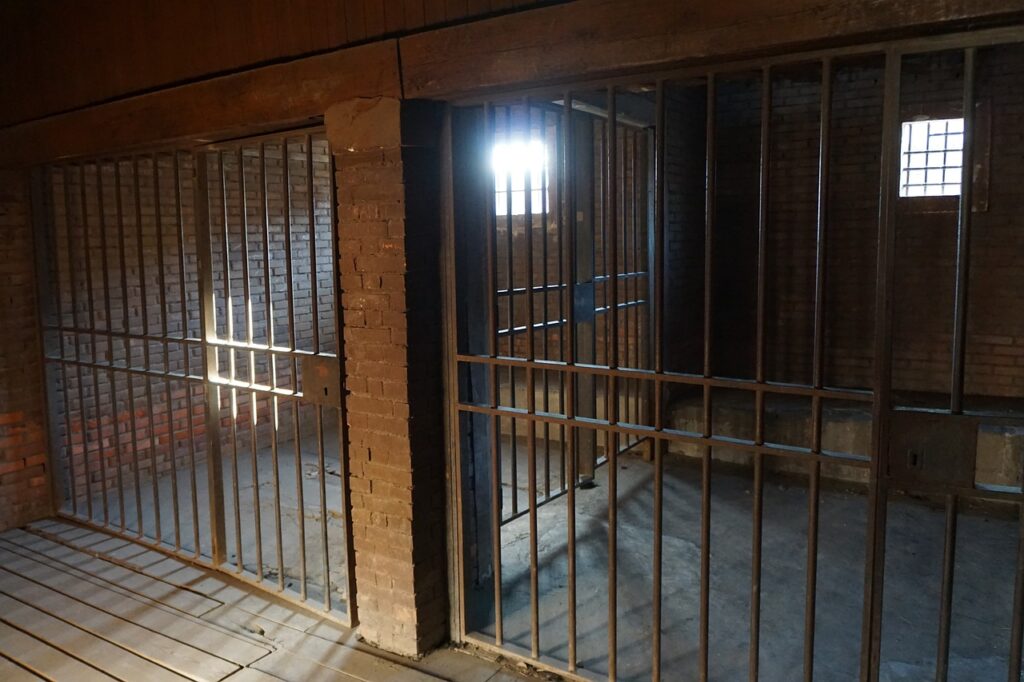News Items
Convicted killer released on parole under California’s ‘elderly people law
Convicted killer released on parole under California’s ‘elderly people law’. Questions arise about the effectiveness and risks associated with this legislation.
In a shocking turn of events, a convicted killer, Walter Joseph Lewis, has been granted parole under California’s “elderly people law.” Despite committing two brutal murders, Lewis is set to be released on Friday, leaving the victim’s family in disbelief and fearing for their safety. The controversial Elderly Parole Law allows anyone over 50 years old who has been in custody for 20 years or more to be eligible for a parole hearing. With the number of inmates being granted parole under this law on the rise, questions arise about the effectiveness and potential risks associated with this legislation.
Convicted killer released on parole under California’s ‘elderly people law’
California law has recently granted parole to a convicted killer, Walter Joseph Lewis, under the state’s “elderly people law.” This decision has raised concerns among the victim’s family, who fear potential retaliation. Lewis, who has a history of violent crimes including two murders, is set to be released despite the family’s expectations of lifelong imprisonment.
Victim’s family fears retaliation
The news of Walter Joseph Lewis’ parole has left the Chartier family, the victim’s relatives, in a state of shock and disbelief. They had always believed that Lewis would spend the rest of his life behind bars for the brutal murders he committed. The family’s primary concern now is the potential for retaliation from Lewis, which has left them feeling unsafe and vulnerable.
Convicted killer’s criminal history
Walter Joseph Lewis’s criminal history includes two murders. The first murder occurred when he was 18 years old and involved the brutal stabbing of a man. Later, in 1979, Lewis used a hammer to attack and kill Robert Chartier. He had previously served 13 and a half years for his first crime, but now, under the elderly parole law in California, he is set to be released.
Family shocked by release
The victim’s family has expressed their shock and disbelief at the decision to release Walter Joseph Lewis on parole. They had always believed that justice would be served by keeping him behind bars for the rest of his life. The news of his impending release has shattered their expectations and forced them to confront the possibility of encountering Lewis in society. The family had hoped that their loved one’s life would be honored and respected through a lifelong prison sentence for Lewis.
Provisions of the California Elderly Parole Law
The California Elderly Parole Law governs the eligibility for parole for individuals who are considered elderly under the law. According to the provisions of this law, anyone over the age of 50 who has been in custody for 20 years or more is entitled to a parole eligibility hearing. The rationale behind these criteria is that individuals over the age of 50 have a decreased risk of violence.
Retired prosecutor explains rationale behind the law
Kathleen Cady, a retired LA County Prosecutor and victim’s rights advocate, sheds light on the legislative reasoning behind the California Elderly Parole Law. According to Cady, the lawmakers considered the decline in the risk of violence with age when formulating the law. The belief is that individuals over the age of 50 are less likely to engage in violent acts compared to younger individuals. This rationale aims to provide an opportunity for rehabilitation and reintegration into society for elderly inmates.

This image is property of images.foxtv.com.
Concerns over potential threat to society
The decision to release Walter Joseph Lewis on parole has sparked concerns over the potential threat he may pose to society. While the California Elderly Parole Law takes into account the decreased risk of violence with age, some argue that age is an insufficient indicator of someone’s capacity for violence. The victim’s family shares these concerns, highlighting that individuals over the age of 50 are still capable of committing violent acts. The safety and well-being of the general public are critical factors to consider when granting parole to elderly inmates with a history of violent crimes.
Controversy surrounding Elderly Parole Law
The California Elderly Parole Law has faced growing controversy in recent years due to the increasing number of parole grants under this program. In 2020, 317 inmates were granted parole, which rose to 360 in 2021 and 493 in 2022, according to CDCR records. This significant increase has sparked debates over the effectiveness and fairness of the law. Critics argue that granting parole to elderly inmates with violent backgrounds poses a potential risk to public safety, questioning the approval process and the potential consequences.
Questioning the approval process
The approval process for granting parole to individuals like Walter Joseph Lewis has come into question. The victim’s family asks those who approved Lewis’s parole if they would make the same decision if it was their own family member involved. The personal reflection and impact on their own family members and loved ones prompt the family to hold those responsible for approving the parole accountable. The decision-making process behind granting parole to individuals with a history of violent crimes needs to be scrutinized to ensure public safety and uphold justice.
Convicted killer granted parole under California ‘elderly’ parole law
Regarding the specific details of Walter Joseph Lewis’s parole grant, he is set to be released on a specified date under the California Elderly Parole Law. The exact release date has not been disclosed, but Lewis will be able to leave custody and reintegrate into society based on the decision made by the parole board and the provisions outlined in the law.
Victim’s family fears retaliation
The victim’s family has been emotionally impacted by the parole grant to Walter Joseph Lewis. They are concerned that Lewis may seek retaliation against them or other individuals connected to the case. The fear of potentially encountering Lewis or facing any form of retribution haunts the family, placing them in a state of constant stress and worry. Despite the passage of time, the wounds caused by the violent acts committed by Lewis have not healed, and his impending release reopens these emotional scars.
Convicted killer’s criminal history
Walter Joseph Lewis’s criminal history involves the murder of two individuals. His first murder occurred when he was 18 years old and involved a brutal stabbing. He later committed another murder in 1979, using a hammer to attack and kill Robert Chartier in San Diego. Lewis was previously incarcerated for a period of 13 and a half years for his first crime, but now, he is being granted parole, sparking shock and disbelief from the victim’s family.
Family shocked by release
The release of Walter Joseph Lewis on parole has profoundly affected the victim’s family, who express their surprise and disbelief at the decision made by the parole board. They had always believed that justice would be served by keeping Lewis behind bars for the rest of his life. The expectation that he would spend his remaining years in prison brought a sense of closure and peace to the family, which has now been shattered. They struggle to comprehend how someone with a history of violent murders can be granted parole and released back into society.
Provisions of the California Elderly Parole Law
The California Elderly Parole Law encompasses specific requirements and criteria for parole eligibility. To be eligible for parole under this law, individuals must be over the age of 50 and have been in custody for 20 years or more. The law acknowledges that individuals over the age of 50 have a decreased risk of violence and aims to provide an opportunity for rehabilitation and reintegration into society. However, the family of the victim questions the applicability of age as an indicator of decreased risk, given the gravity of the crimes committed by Walter Joseph Lewis.
Retired prosecutor explains rationale behind the law
Kathleen Cady, a retired LA County Prosecutor, sheds light on the legislative reasoning behind the California Elderly Parole Law. The justification for granting parole to elderly inmates is based on the belief that the risk of violence decreases with age. The legislative history of the law emphasizes that individuals over the age of 50 are less likely to engage in violent acts. This rationale aims to strike a balance between punishment and the possibility of rehabilitation for elderly inmates. However, critiques of the rationale argue that age alone is an insufficient indicator of someone’s propensity for violence and that other factors should be considered as well.
Concerns over potential threat to society
The imminent release of Walter Joseph Lewis under the California Elderly Parole Law has raised concerns about the potential threat he may pose to society. While the law takes into account the decreased risk of violence with age, it fails to consider other factors that contribute to an individual’s capacity for violence. The victim’s family is deeply concerned that Lewis’s release as an elderly inmate does not guarantee public safety. They argue that age should not be the sole determinant in assessing the risk an individual may pose to society and advocate for a closer examination of the potential danger posed by elderly inmates with a history of violent crimes.
Controversy surrounding Elderly Parole Law
The controversy surrounding the California Elderly Parole Law has intensified over the years due to the increasing number of parole grants under the program. In 2020, 317 inmates were granted parole, a number that rose to 360 in 2021 and 493 in 2022, as stated by CDCR records. This significant increase has fueled debates over the effectiveness and fairness of the law. Critics argue that the parole approval process needs to be more comprehensive and stringent, particularly when it comes to inmates with a history of violent crimes. The controversy surrounding the law hinges on the balance between providing opportunities for rehabilitation and considering public safety.
Questioning the approval process
The approval process for granting parole to individuals like Walter Joseph Lewis is being called into question by the victim’s family. They express their concerns and doubts about the decision-making process surrounding Lewis’s parole. They ask those involved in approving his release if they would make the same decision if their own family member was involved. The personal reflection on the impact such decisions have on loved ones pushes for a reassessment of the approval process. It is essential to ensure that the parole system safeguards public safety and acts in the best interest of justice.





